
STUDIES IN ROMANTICISM
Scope & Guideline
Pioneering New Dialogues in Romantic Studies
Introduction
Aims and Scopes
- Interdisciplinary Approaches:
The journal promotes research that bridges literature with disciplines such as history, politics, cultural studies, and environmental humanities, encouraging a comprehensive understanding of Romanticism. - Focus on Language and Translation:
A significant area of research involves the exploration of language, translation, and multilingualism, especially in the context of Romantic works and their influences across cultures. - Critical Examination of Race and Identity:
The journal emphasizes critical perspectives on race, identity, and colonialism within Romantic literature, examining how these themes manifest in the works of various authors. - Ecocritical Perspectives:
Recent publications highlight an ecocritical approach to Romanticism, investigating the relationship between literature and environmental issues, reflecting on concepts such as nature, landscape, and ecological knowledge. - Cultural and Historical Contexts:
The journal contextualizes Romantic texts within their historical and cultural frameworks, exploring social movements, political ideologies, and the impact of historical events on literary production.
Trending and Emerging
- Postcolonial and Diasporic Studies:
Recent publications increasingly address postcolonial themes, exploring the intersections of Romantic literature with colonial histories and diasporic identities, thus broadening the scope of Romantic studies. - Environmental and Ecocritical Discourse:
A surge in ecocritical analyses indicates a growing concern for environmental issues and the representation of nature in Romantic literature, linking historical texts to current ecological debates. - Transnational and Multilingual Perspectives:
Emerging themes include the exploration of transnational influences and multilingualism in Romantic literature, reflecting a diverse range of voices and experiences beyond the Anglo-centric canon. - Gender and LGBTQ+ Studies:
There is an increasing focus on gender studies and LGBTQ+ perspectives within Romanticism, examining how these identities shape narratives and literary forms during the Romantic period. - Digital Humanities and Romanticism:
The integration of digital humanities methodologies is gaining traction, allowing for new forms of analysis and engagement with Romantic texts, including data visualization and digital archiving.
Declining or Waning
- Traditional Romanticism:
There appears to be a decline in the exploration of traditional Romantic themes such as the sublime and individualism, as newer research tends to engage more with contemporary issues and diverse perspectives. - Focus on Canonical Authors:
Research centered on canonical Romantic authors like Wordsworth, Coleridge, and Byron is decreasing, with more emphasis being placed on lesser-known figures and marginalized voices within the Romantic period. - Static Interpretations of Romanticism:
The journal has moved away from static interpretations of Romantic texts, favoring dynamic, intersectional analyses that incorporate gender, race, and postcolonial critiques. - Historical Romanticism:
There is a noticeable reduction in articles focusing solely on the historical context of Romanticism without integrating contemporary relevance, as the journal shifts towards examining Romanticism's ongoing impact on modern discourse.
Similar Journals

Studia Theodisca
Connecting Ideas, Inspiring NarrativesStudia Theodisca is a distinguished academic journal published by Milano University Press that has been contributing to the fields of Cultural Studies and Literature and Literary Theory since its inception. With an ISSN of 1593-2478 and E-ISSN 2385-2917, this Open Access journal, available since 1994, ensures that research is freely accessible, fostering a global exchange of ideas. Located in Milan, Italy, the journal has gained traction within the academic community, reflected in its rankings: Q4 in Cultural Studies and Q3 in Literature and Literary Theory as of 2023. Despite its relatively new presence in Scopus, being placed in the ranks of 733 out of 1106 for Literature and Literary Theory and 1092 out of 1304 for Cultural Studies, it remains committed to advancing scholarly dialogue and exploring diverse narratives. Studia Theodisca serves as a vital platform for researchers, professionals, and students seeking to engage with innovative contributions and contemporary thought in these dynamic areas of study.
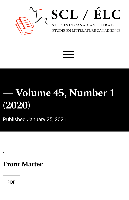
STUDIES IN CANADIAN LITERATURE-ETUDES EN LITTERATURE CANADIENNE
Illuminating Voices in Canadian Literary DiscourseSTUDIES IN CANADIAN LITERATURE-ETUDES EN LITTERATURE CANADIENNE, published by the University of New Brunswick, is a leading academic journal dedicated to the exploration and analysis of literature in the Canadian context. With an ISSN of 0380-6995 and an E-ISSN of 1718-7850, this journal has been serving scholars, students, and professionals interested in the rich tapestry of Canadian literary studies since its inception. Recognized in the 2023 Q2 category in Literature and Literary Theory, and ranking in the 49th percentile of its field according to Scopus metrics, it provides a platform for innovative research, critical reviews, and theoretical discussions that deepen our understanding of Canadian literature. Although it is not an open-access journal, the rigorous peer-reviewed nature of its content ensures high standards of academic integrity, making it a valuable resource for anyone engaged in the literary arts. The journal covers a distinct range of topics, embracing both historical perspectives and contemporary issues, thus positioning itself as a vital scholarly contribution to the field.

Romanic Review
Fostering Innovative Research in Romance CulturesThe Romanic Review, published by Duke University Press, stands as a significant scholarly platform in the field of Romance languages and literature. With its ISSN 0035-8118 and E-ISSN 2688-5220, this journal has been serving the academic community since its inception and will continue its contribution until 2024. Situated in the United States, it has carved out a vital niche in the Arts and Humanities, currently falling within the Q3 quartile as per the 2023 rankings. Although it operates under a traditional subscription model, its focus on disseminating critical and innovative research makes it an indispensable resource for scholars and students alike. The Romanic Review is dedicated to fostering academic discussions that bridge interdisciplinary gaps, making it a cornerstone reference for anyone engaged in the study of Romance cultures, linguistics, and literary studies.
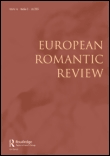
European Romantic Review
Connecting Past and Present through Romantic LiteratureEuropean Romantic Review is a distinguished journal published by Routledge Journals, Taylor & Francis Ltd, focusing on the critical exploration of Romantic literature and its cultural impact. Since its inception in 1990, the journal has been a vital platform for scholarly discourse in the fields of Cultural Studies and Literature and Literary Theory, with an esteemed ranking in the 61st percentile for its contributions to the literature domain. Despite not being open access, European Romantic Review provides valuable insights to researchers, offering a rich repository of articles that engage with the complexities of Romantic thought, authorship, and aesthetics. The journal's commitment to advancing academic knowledge makes it an essential read for scholars, professionals, and students interested in the nuances of the Romantic era and its lasting influence on contemporary discourse.
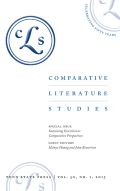
COMPARATIVE LITERATURE STUDIES
Connecting Cultures through Critical AnalysisComparative Literature Studies is a distinguished journal published by Penn State University Press, focusing on the diverse and evolving field of comparative literature. With an ISSN of 0010-4132 and an E-ISSN of 1528-4212, this quarterly journal has been a critical platform for scholarly dialogue and interdisciplinary research since its inception in 2000. The journal proudly ranks in the Q3 category for Cultural Studies and Q2 for Literature and Literary Theory (2023), showcasing its significant impact within these domains. Notably, it ranks #214/1106 in Literature and Literary Theory according to Scopus, placing it in the 80th percentile—highlighting its relevance and quality in the global academic landscape. Despite its traditional subscription model, the journal remains a crucial resource for researchers, professionals, and students keen on exploring the intersections of cultures, texts, and histories. By publishing cutting-edge research and critical essays, Comparative Literature Studies aims to expand the horizons of literary analysis and foster innovative scholarly exchanges.
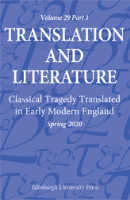
Translation and Literature
Innovating Perspectives on Translation and TextsTranslation and Literature is a leading academic journal published by Edinburgh University Press, focusing on the intricate relationship between language and literature within the realms of translation studies. With an ISSN of 0968-1361 and an E-ISSN of 1750-0214, this journal provides a crucial platform for scholars and practitioners to explore and disseminate research that addresses both the theoretical and practical aspects of translation. Since its inception in 1996, Translation and Literature has established itself as an essential resource, particularly noted for its contributions to the fields of linguistics and literary theory, as indicated by its Q4 ranking in both categories in 2023. The journal's articles are designed to foster dialogue across disciplines, encouraging innovative thinking and collaboration among researchers, professionals, and students alike. Access to this valuable resource is currently available through subscription, ensuring high-quality scholarship reaches a diverse audience dedicated to advancing the understanding of translation's role in literature.
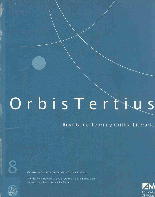
Orbis Tertius
Empowering Scholars, Transforming CommunitiesOrbis Tertius is an esteemed academic journal published by the National University of La Plata, Faculty of Humanities and Educational Sciences, dedicated to the multifaceted fields of humanities, social sciences, and educational research. Since its inception in 1996, this Open Access journal has been committed to facilitating the dissemination of scholarly work that fosters critical thinking and dialogue amongst researchers and practitioners from diverse backgrounds. With a focus on innovative methodologies and interdisciplinary approaches, Orbis Tertius serves as a platform for high-quality research that enriches our understanding of complex societal issues. The journal’s accessibility ensures that valuable insights are available to a global audience, making it a vital resource for academics, students, and professionals striving for excellence in their respective fields. Located in La Plata, Argentina, it invites contributions that reflect the dynamic nature of contemporary humanities and educational practices.
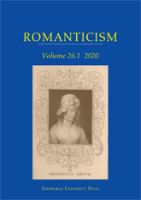
Romanticism
Unveiling the Intersections of Culture and RomanticismRomanticism, published by Edinburgh University Press, is a pivotal journal dedicated to the scholarly examination of Romantic literature and its cultural contexts. With ISSN 1354-991X and E-ISSN 1750-0192, this journal has established itself within the academic community, particularly noted for its contributions to the field as evidenced by its 2023 ranking in the Q4 category for Literature and Literary Theory. The journal operates from the United Kingdom and encompasses a wide scope of topics related to Romanticism, including critical analyses, historical studies, and interdisciplinary approaches. Serving as a valuable resource for researchers, professionals, and students alike, Romanticism plays a crucial role in fostering dialogue and scholarship, helping to illuminate the complexities of the Romantic period from 1996 to 2024. Although it does not currently offer Open Access, its commitment to quality scholarship is evident, inviting contributions that push the boundaries of current Romantic studies.
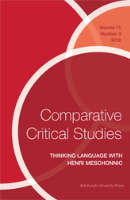
Comparative Critical Studies
Bridging Cultures through Scholarly ExplorationComparative Critical Studies, published by Edinburgh University Press, is a distinguished journal that serves as a vital platform for scholarly discourse in the fields of Cultural Studies and Literature and Literary Theory. Since its inception in 2004, this peer-reviewed journal has garnered significant recognition, achieving a Q2 rating in Cultural Studies and a prestigious Q1 rating in Literature and Literary Theory according to the 2023 Category Quartiles. With its focus on comparative analyses and interdisciplinary approaches, the journal engages a wide range of perspectives from contemporary scholarship, exploring the intricacies of cultural and literary phenomena. Researchers, professionals, and students alike will find value in its rich repository of critical insights, contributing to a deeper understanding of the global literary landscape. Although the journal operates on a traditional subscription model, it remains accessible to a broad audience, creating opportunities for innovative dialogues and collaborations in the evolving fields of literary and cultural studies. Located in the heart of Edinburgh, a city renowned for its rich literary heritage, the journal continues to foster an environment of academic excellence and cultural critique.
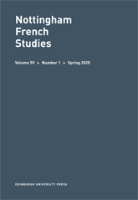
NOTTINGHAM FRENCH STUDIES
Advancing Scholarship in French StudiesNOTTINGHAM FRENCH STUDIES is a distinguished academic journal published by Edinburgh University Press, focusing on the diverse realms of French language, literature, culture, and history. With its ISSN 0029-4586 and E-ISSN 2047-7236, the journal serves as a vital platform for scholarly discourse, featuring interdisciplinary research that bridges gaps between Cultural Studies, Linguistics, and Literary Theory. Notable for its robust performance, it holds a Q3 ranking in Cultural Studies and Linguistics and a Q2 ranking in Literature and Literary Theory as of 2023, placing it among the key publications within its field. Throughout its publication span from 1996 to 2024, NOTTINGHAM FRENCH STUDIES has consistently catered to the academic community with insightful articles, enriching the understanding of French cultural contexts. While it is not an Open Access journal, its contributions are pivotal in advancing scholarly dialogue and fostering critical perspectives, making it an essential resource for researchers, professionals, and students engaged in French studies and its interdisciplinary connections.